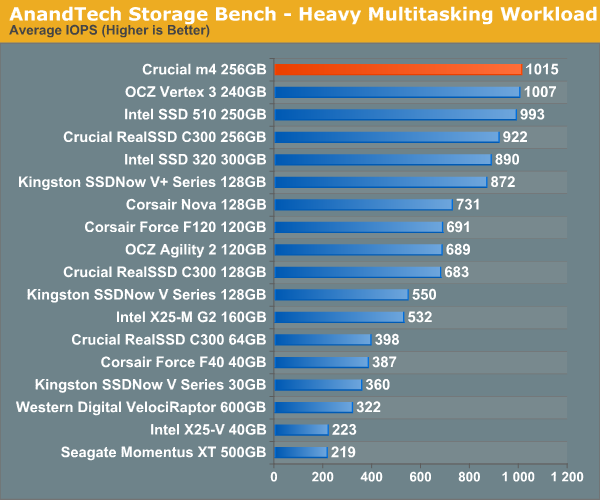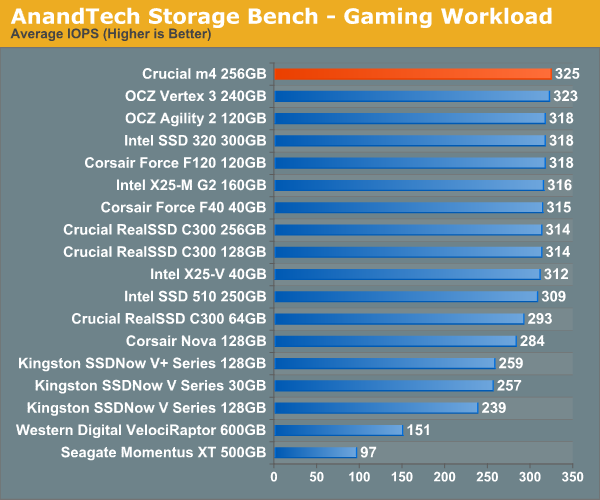The Crucial m4 (Micron C400) SSD Review
by Anand Lal Shimpi on March 31, 2011 3:16 AM ESTAnandTech Storage Bench 2010
To keep things consistent we've also included our older Storage Bench. Note that the old storage test system doesn't have a SATA 6Gbps controller, so we only have 3Gbps results for the 6Gbps drives.
The first in our benchmark suite is a light/typical usage case. The Windows 7 system is loaded with Firefox, Office 2007 and Adobe Reader among other applications. With Firefox we browse web pages like Facebook, AnandTech, Digg and other sites. Outlook is also running and we use it to check emails, create and send a message with a PDF attachment. Adobe Reader is used to view some PDFs. Excel 2007 is used to create a spreadsheet, graphs and save the document. The same goes for Word 2007. We open and step through a presentation in PowerPoint 2007 received as an email attachment before saving it to the desktop. Finally we watch a bit of a Firefly episode in Windows Media Player 11.
There’s some level of multitasking going on here but it’s not unreasonable by any means. Generally the application tasks proceed linearly, with the exception of things like web browsing which may happen in between one of the other tasks.
The recording is played back on all of our drives here today. Remember that we’re isolating disk performance, all we’re doing is playing back every single disk access that happened in that ~5 minute period of usage. The light workload is composed of 37,501 reads and 20,268 writes. Over 30% of the IOs are 4KB, 11% are 16KB, 22% are 32KB and approximately 13% are 64KB in size. Less than 30% of the operations are absolutely sequential in nature. Average queue depth is 6.09 IOs.
The performance results are reported in average I/O Operations per Second (IOPS):

Lighter read-heavy workloads do very well on the m4. Thankfully for Crucial, most user workloads tend to be very read intensive. Over a 3Gbps interface, the m4 is a bit faster than Intel's 320 in our typical workload from 2010.
If there’s a light usage case there’s bound to be a heavy one. In this test we have Microsoft Security Essentials running in the background with real time virus scanning enabled. We also perform a quick scan in the middle of the test. Firefox, Outlook, Excel, Word and Powerpoint are all used the same as they were in the light test. We add Photoshop CS4 to the mix, opening a bunch of 12MP images, editing them, then saving them as highly compressed JPGs for web publishing. Windows 7’s picture viewer is used to view a bunch of pictures on the hard drive. We use 7-zip to create and extract .7z archives. Downloading is also prominently featured in our heavy test; we download large files from the Internet during portions of the benchmark, as well as use uTorrent to grab a couple of torrents. Some of the applications in use are installed during the benchmark, Windows updates are also installed. Towards the end of the test we launch World of Warcraft, play for a few minutes, then delete the folder. This test also takes into account all of the disk accesses that happen while the OS is booting.
The benchmark is 22 minutes long and it consists of 128,895 read operations and 72,411 write operations. Roughly 44% of all IOs were sequential. Approximately 30% of all accesses were 4KB in size, 12% were 16KB in size, 14% were 32KB and 20% were 64KB. Average queue depth was 3.59.

Last year's heavy multitasking workload was also predominantly read heavy. The m4 does very well here again, roughly equaling the performance of OCZ's Vertex 3.
The gaming workload is made up of 75,206 read operations and only 4,592 write operations. Only 20% of the accesses are 4KB in size, nearly 40% are 64KB and 20% are 32KB. A whopping 69% of the IOs are sequential, meaning this is predominantly a sequential read benchmark. The average queue depth is 7.76 IOs.

Gaming performance is good but we're of course bottlenecked by the 3Gbps SATA interface in this test.










103 Comments
View All Comments
JNo - Thursday, March 31, 2011 - link
On another note, now that my system drive is an 80GB Intel X25M SSD, I really notice how my Documents folders that all have to be on mechanical HDDs due to their size, are very unresponsive. In fact often Win 7 hangs for about 10-15 secs just trying to open my Documents or Video folder when nothing else is going on! (This on a Core2 Q6600 so not a netbook or anything).Whilst I'm sure I would benefit from a 6Gbs controller and a Vertex 3 or m4, I wonder if the smart money in future will go on getting one or two cheap(er!) 40GB SSDs to act as cache drives for my couple of larger (1 - 2 TB) media and Documents drives. The figures on Tomshardware on Z68 caching performance were not awe inspiring but definitely a great option to have...
james.jwb - Thursday, March 31, 2011 - link
The HDD is probably going into sleep mode. Happens to mine all the time with an SSD. I hear it spin up as my PC is silent apart from the HDD. Could always turn it off or prolong it kicking in.strikeback03 - Thursday, March 31, 2011 - link
Seconded, I hear the same thing on my Win7 desktop with an 80GB X25M G2 and 3 mechanical HDDs. The HDDs go to sleep after 15-30 min, and take several seconds to spin back up when data is needed. It isn't enough of a bother to me to change the sleep time, but it can be done if necessary.softdrinkviking - Thursday, March 31, 2011 - link
Anand,you've already seen the results of the new samsung drive, and the new corsair, and who knows how many other SSDs are currently being pu tthrough the paces in your lab.
those drives that are still officially unknown paint a more complete picture of the industry and the future of SSDs.
how much would you say your reviews reflect that bigger picture?
are we to assume that you are giving us your opinion of this drive from our perspective, or yours?
I know that can be a hard balance to strike in writing, between the prescient and the contemporaneous, and I can't help but wonder.
Anand Lal Shimpi - Thursday, March 31, 2011 - link
I'd say the majority of what you see here is reflecting the bigger picture. The Corsair P3 is nice but it seems to fall behind Intel's 510. The Samsung 470 is a great 3Gbps offering but it's a bit pricey. I still have some additional testing to do on both of those, which I expect to be done (realistically) next week.Take care,
Anand
Lonesloane - Thursday, March 31, 2011 - link
I'm really missing "real world benchmarks", such as loading times. These synthetical benchmarks mean nothing to me.In general it seems as Sandforce will be the big winner of the SSD market in 2011.
Anand Lal Shimpi - Thursday, March 31, 2011 - link
Load times for a single application are pretty much consistant through all of the modern SSDs. It's really in the heavy workload scenarios or periods of burst activity that you'll see differences. Note that our own storage bench suite plays back real world IO tasks that encompass exactly what you're looking for :)Take care,
Anand
sticks435 - Thursday, March 31, 2011 - link
One thing I'd like to see is the Vantage scores on a Sandy Bridge platform. Since most other sites use it as their real world benchmark, and they/most users will probably be using these new drives with a SB system, it makes it a little easier to compare numbers. Yes, I know comparing from site to site is usually a crap shoot, but would still be a nice to have. Perhaps when PC Mark 7 is available.shatteredx - Thursday, March 31, 2011 - link
For many of us, SSD performance has reached the "good enough" milestone. The "big winner" of the SSD in market in 2011 will be whoever is willing to price these things the cheapest combined with typical customer feedback that the drives are reliable.Anand's prediction that we'll have to wait until 2014 for prices to drop under $1/GB is not comforting.
geniekid - Thursday, March 31, 2011 - link
++. In fact, I thought SSDs were good enough two years ago. Give me one of these new SSDs with HALF the performance and twice the storage size at the same price and I'll take it.